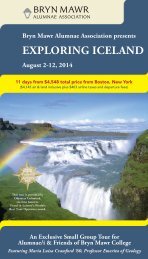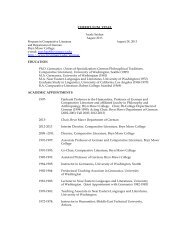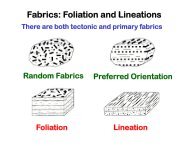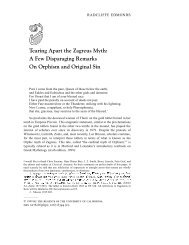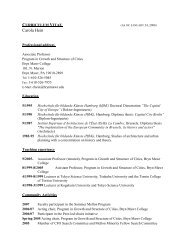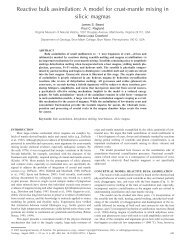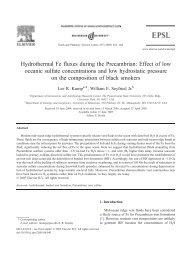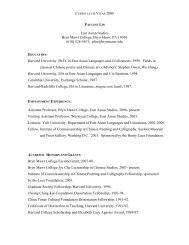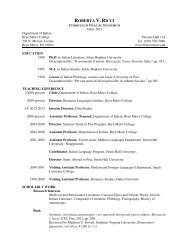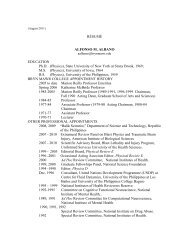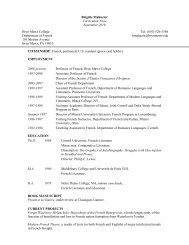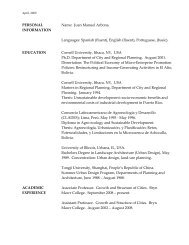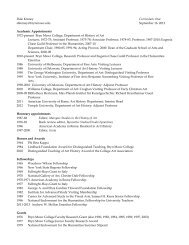Rediscovering Ying Qu and His Poetic Relationship to Tao Qian (clik ...
Rediscovering Ying Qu and His Poetic Relationship to Tao Qian (clik ...
Rediscovering Ying Qu and His Poetic Relationship to Tao Qian (clik ...
You also want an ePaper? Increase the reach of your titles
YUMPU automatically turns print PDFs into web optimized ePapers that Google loves.
<strong>Ying</strong> <strong>Qu</strong> <strong>and</strong> <strong>His</strong> <strong>Poetic</strong> <strong>Relationship</strong> <strong>to</strong> <strong>Tao</strong> <strong>Qian</strong> 53<br />
pedias; three of these letters can be read as literary precedents <strong>to</strong> <strong>Tao</strong><br />
<strong>Qian</strong>’s writings.<br />
A poignant letter, “Yu congdi Junmiao Junzhou shu” 與 從 弟 君 苗<br />
君 冑 書 (Letter <strong>to</strong> my cousins Junmiao <strong>and</strong> Junzhou), illustrates <strong>Ying</strong><br />
<strong>Qu</strong>’s strong stylistic resemblance <strong>to</strong> <strong>Tao</strong> <strong>Qian</strong>’s pas<strong>to</strong>ral poetry. Writing<br />
the letter <strong>to</strong>ward the end of his life, <strong>Ying</strong> <strong>Qu</strong> recalls a recent excursion<br />
<strong>to</strong> Mang Mountain with his younger cousins, describes his quiet<br />
life back in the city <strong>and</strong> his desire <strong>to</strong> retire, <strong>and</strong> then goes on <strong>to</strong> warn<br />
his relatives of the perils of a life in service, while implicitly expressing<br />
his own disappointment at not having been able <strong>to</strong> serve. In conclusion<br />
he projects in<strong>to</strong> the future, when he would be able <strong>to</strong> retire, <strong>and</strong> <strong>to</strong><br />
“follow the old man, raising chickens <strong>and</strong> planting corn, / studying the<br />
classics, / <strong>and</strong> <strong>to</strong> establish a name for himself [<strong>Ying</strong> <strong>Qu</strong>].”59<br />
The descriptive language <strong>and</strong> the <strong>to</strong>ne in this letter are reminiscent<br />
of some of <strong>Tao</strong> <strong>Qian</strong>’s best-known works.60 In the opening section cited<br />
below, <strong>Ying</strong> <strong>Qu</strong> recalls their recent travels <strong>to</strong>gether:<br />
A short while back we traveled north <strong>to</strong>gether, I was infinitely exhilarated!<br />
We ascended the Mang Mountain <strong>and</strong> crossed the Yellow River—so expansive<br />
that it was as if our eyes had been opened [for the first time]. The Wind<br />
Deity swept the road, <strong>and</strong> the Master of Rain drizzled the paths. Pulling<br />
in the reins, we rode leisurely on this clean <strong>and</strong> uncluttered path, gazing at<br />
the surrounding mountainous wilderness. On arrival, we poured the spring<br />
wine. One step after another, we strolled beneath the thatched huts; the<br />
cool [of the thatched huts] surpasses that of gr<strong>and</strong> mansions. Tiny [though]<br />
the inch-length (cun 寸 ) [scrap] of dried meat may be, their flavors far surpass<br />
an entire feast table. We sailed freely on the pond, <strong>and</strong> recited poetry<br />
beneath the lush willows. We gathered fragrant spring flowers <strong>to</strong> enhance<br />
our girdle adornments, <strong>and</strong> broke off branches from the ruo [Pollia japonica]<br />
tree <strong>to</strong> shade ourselves from the sun. With corded arrow, we downed<br />
birds flying high in the clouds, <strong>and</strong> our bait lured forth fish from the pool’s<br />
59<br />
Wenxuan, 42.15b–17a; also in <strong>Qu</strong>an Sanguo wen, 30.2a–3a, in Yan Kejun, 2:1218–19. Lu<br />
Kanru argues that this piece was written late in <strong>Ying</strong> <strong>Qu</strong>’s life, at the age of sixty-one sui,<br />
Lu Kanru, 1:559. The quotation is from Zizhang’s words in the Analects; “the old man with<br />
a staff ” refers <strong>to</strong> the recluse from whom Zilu sought help <strong>to</strong> look for Confucius. During<br />
his search, Zilu encountered an old man weeding his field. The man invited Zilu home for<br />
a meal of fresh poultry <strong>and</strong> millet from the field. <strong>His</strong> existence is an allusion <strong>to</strong> that of the<br />
recluse’s. Lunyu zhengyi, 21.7b.<br />
60<br />
For instance, Lu Qinli, 2:974–75; 983; 985–88; 991–92; 1010.



